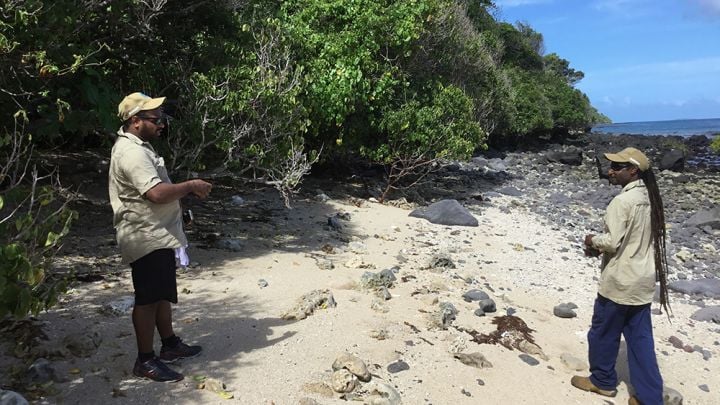
The Torres Strait Regional Authority (TSRA) Environmental Management Program, with funding from the Australian Government’s National Landcare Program, is facilitating new beach shading projects for selected turtle nesting beaches on Erub and Mer.
The Beach Shade Tree project has been developed in response to the impacts of climate change on turtles in the Torres Strait region.
The TSRA Chairperson, Mr Napau Pedro Stephen AM, said the project is a collaborative effort between Land and Sea Management Unit teams, the Torres Strait Island Regional Council, Regional Native Title Bodies Corporate, My Pathway, Traditional Owners and community members.
“The Torres Strait is an extremely important area for turtles nationally and internationally, especially Green, Flatback and Hawksbill turtles,” Mr Stephen said.
“All these species are also of very high cultural value to local communities and this project engages stakeholders in a collaborative effort to reduce the climate risks to the region’s turtles.
“Climate change also threatens turtles in other ways including erosion of nesting beaches, drowning of nests, higher hatchling death when sand temperatures go above lethal levels, changes to seasonal timing of nesting and hatching, and broader impacts on sea country that impact the fitness and survivability of turtles.”
Community consultation has provided the TSRA with an opportunity to educate the community on climate change adaptation, by identifying the most suitable use of shade trees to help combat the impacts of rising heat and sea levels on coastal ecosystems, marine life (especially nesting turtles), food production and human wellbeing.
The sex of turtles is determined by the sand temperature of the beaches where they are laid.
Warmer temperatures lead to more females, and with the increase in land and sea temperatures due to climate change there is a concern that fewer and fewer male turtles are being produced.
Increasing the shading of key nesting beaches will hopefully help to keep a more balanced sex ratio of hatchlings.
TSRA Land Officer George Saveka has been assisting Mer and Erub Rangers to identify and choose the suitable trees to provide cool shade relief to areas of their local beaches.
Using a range of tree propagation techniques, TSRA Rangers are working towards producing tree crops for shade and where possible, fruit trees for sustainable food sources.
On Mer and Erub, Rangers have already shown great initiative towards the project and working closely within their communities, they have already chosen native tree species and trialled a variety growing practices.
These efforts are now producing plants to grow and support Island communities in adapting to climate change.
Pictured: Rangers Kevin Mye and Parry Pau at Kemus Beach

